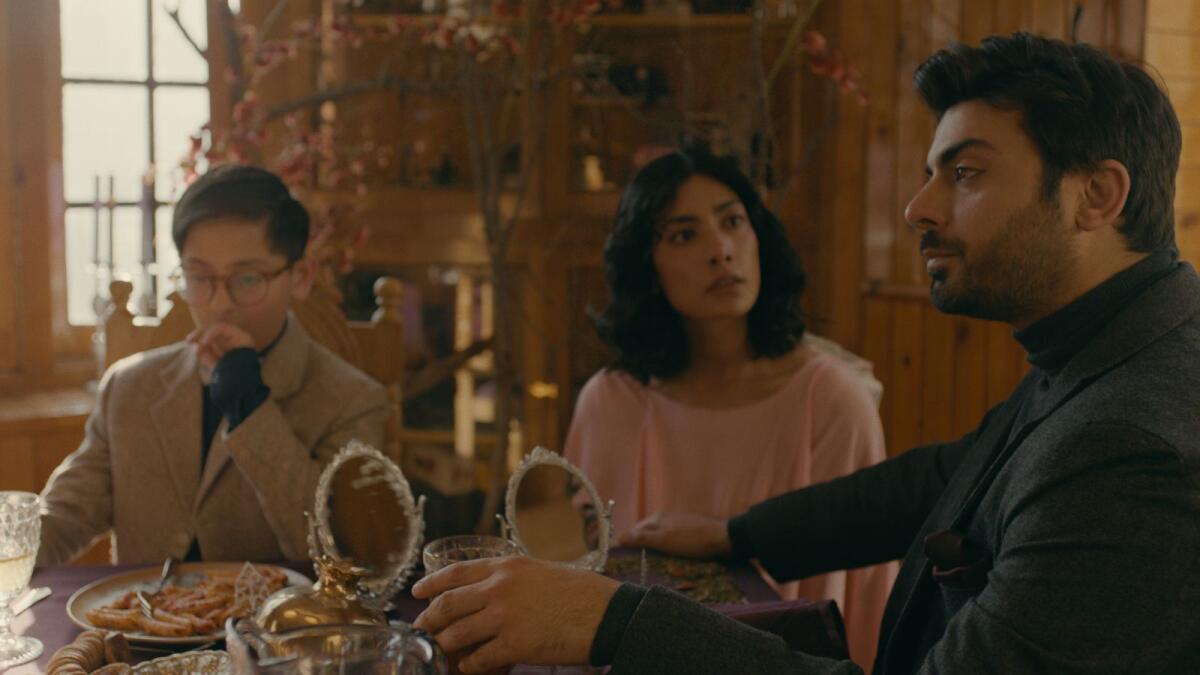Asim Abbasi’s highly anticipated mini-series Barzakh has finally premiered on Zee5 Global. The show, written and directed by Abbasi and produced by Shailja Kejriwal, features a star-studded cast including Fawad Khan, Sanam Saeed, M. Fawad Khan, Khushhal Khan, Sajid Hasan, Salman Shahid, Nighat Choudhry, and Uzma Beg. Set in the fictional “Land of Nowhere,” the story revolves around the enigmatic Jaffar Khanzada, played by Salman Shahid, who is preparing to marry for the third time to his long-lost love Mehtab, who has been dead for 60 years. As his sons Sheheryar (Fawad Khan) and Saifullah (M. Fawad Khan) visit him, they are taken on a mysterious journey by Khanzada’s assistant Scheherzaade (Sanam Saeed), exploring themes of love, capitalism, mysticism, and romanticism.
Set against the breathtaking backdrop of Pakistan’s northwestern mountains and valleys, Barzakh immerses viewers in an otherworldly experience filled with metaphors and allegories. Unlike Abbasi’s previous works like Churails and Cake, which featured practical tales with larger-than-life characters, Barzakh delves into symbolism reminiscent of Aronofsky and Bergman, infused with a unique Pakistani perspective. The storyline touches on themes of capitalism, land usurpation, lost love, and soulful connections, portraying the complexities of life through the characters’ experiences in the mystical world of Barzakh, reminiscent of Wes Anderson’s style with colorful and intricate visuals.
The stunning cinematography by Mo Azmi adds depth to the storytelling, with each frame resembling a living Renaissance painting. Abbasi’s attention to detail in set design and wardrobe complements the narrative, creating a visually rich tapestry that juxtaposes warmth with isolation, mirroring the paradoxes of life. Fawad Khan’s captivating performance elevates the series, bringing charm and depth to his character with subtle nuances and impeccable timing. Sanam Saeed’s portrayal as Scheherzaade adds gravitas to the surreal storyline, while Sajid Hasan’s role as Lumberdaar provides a voice of conscience in a world seemingly devoid of morals, enhancing the narrative’s complexity.
Despite its visual and performance strengths, Barzakh’s chief flaw lies in its slow pacing and an excess of allegorical elements that may overwhelm some viewers. The episodic structure follows a theatrical rhythm that may test the patience of modern audiences, detracting from the central storyline and deeper conflicts that could have been explored in more depth. While the first episode may leave some viewers wanting more cohesiveness in the storytelling, the series holds promise for Fawad Khan’s fans and those seeking artistic and intellectual themes in a Pakistani context. It is hoped that future episodes will provide more context and clarity to the narrative, revealing the timeless potential of Barzakh’s premise.
In conclusion, Barzakh offers a unique blend of surreal storytelling, compelling performances, and stunning visuals that create an immersive viewing experience for audiences. While the series may not appeal to all viewers due to its slow pace and complex allegorical layers, it has the potential to resonate with fans of Fawad Khan and those interested in thought-provoking narratives. As the story unfolds in subsequent episodes, it will be interesting to see how Abbasi weaves together the various themes and characters to deliver a cohesive and impactful conclusion, making Barzakh a series worth following for its artistic and intellectual merit.











